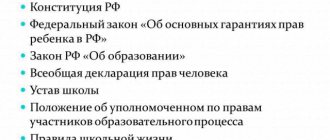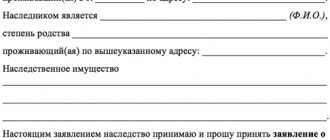Respect for the rights and interests of the child is the main responsibility of parents. And the physical and psychological development of the child depends on how well this duty is fulfilled.
Therefore, the rights, duties and responsibilities of parents are enshrined in law.
In addition, at the legislative level, administrative and criminal liability of parents is established for failure to fulfill the functions provided for by the Family Code of the Russian Federation.
From the article you will learn about the procedure for exercising parental rights and sanctions in case of non-fulfillment.
Grounds for parental rights
According to family law, a child has the right to be raised by both parents, regardless of whether they are married or divorced.
All issues related to the upbringing of common children are resolved by both parents by mutual consent and taking into account the opinions of minors.
If parents have questions about how to raise their children, they resolve them through negotiations. If it is impossible to resolve the dispute peacefully, parents have the right to appeal to the guardianship authority or to court.
The basis for the emergence of parental rights is their legally established blood relationship, that is, the origin of the child from a specific mother and father.
The origin of a child from a specific mother is established on the basis of a medical birth certificate confirming the birth of the child by the mother in a medical organization. If a child is born outside a medical organization, the fact of the child’s origin from the mother is confirmed on the basis of medical documents, witness testimony or other evidence.
The father of the child is recognized as the husband of the child's mother, and the fact of registration of marriage between them must be documented by a marriage certificate.
Please note: if a child was born within three hundred days after the divorce, then the former spouse of the child’s mother is automatically recognized as the father.
If a child was born to unmarried persons, then paternity is established by submitting a joint application from the mother and father to the registry office.
It is important to know : if a child has reached the age of majority, then establishing paternity in his respect is allowed only with the consent of the adult.
The procedure for state registration of the birth of children is regulated by Federal Law dated November 15, 1997 No. 143-FZ “On Acts of Civil Status”. In accordance with the provisions of the above law, an entry about his parents is made in the birth certificate of the child. This record is documentary evidence of the relationship between parents and child.
Let's protect the family - protect the children
The norms of the Basic Law determine all aspects of our existence: state-political, economic, social, moral and spiritual.
Ideally, the Constitution should express the basic values of our society in the language of law. The degree of family protection and children's rights is an important indicator of the level of social guarantees of the state. The family has been and remains one of the main mechanisms for the reproduction and improvement of society through the accumulation and transmission of experience, traditions and basic values to future generations.
Increasing the social significance of the family, strengthening marriage and family relations - all this is directly related to the further development of the country. The family is the basis of both society and the state.
It is no coincidence that the Universal Declaration of Human Rights of 1948 and the United Nations Convention on the Rights of the Child of 1989 note that the family, as a natural environment for the growth and well-being of all its members and especially children, must be provided with the necessary protection and assistance.
The institution of family in the constitutions of most states is the subject of special support.
Turning to Russian political and legal history, it is worth noting that the first Soviet Constitutions (1918, 1924, 1925) were aimed at solving primarily sociotechnical problems and did not affect family relations.
It is no coincidence that the first code in the country was dedicated specifically to marriage and family.
In 1918, a code of laws on acts of civil status, marriage, family and guardianship law was adopted.
According to Art. 154 of the Code “parents are obliged to take care of the personality of minor children, their upbringing and preparation for useful activities.”
However, first of all, the code was aimed at destroying the traditional, so-called. bourgeois family by prohibiting the church procedure for marriage and completely excluding the private law aspect from family relations.
The Law on Amendments to the Constitution of the Russian Federation establishes that children are the most important priority of Russian state policy
In the wake of the sexual revolution that arose in the first years of Soviet power, complete non-interference by the authorities in the relations of married couples was proclaimed, but the upbringing of children was supposed to be transferred to the hands of the state. Eight years later, in 1926, the Code of Laws on Marriage, Family and Guardianship was in force in the RSFSR, which created the preconditions for the separation of family relations for regulation by an independent branch of legislation with a predominance of public law norms.
But as Soviet power strengthened, the leftist overtures of the first post-revolutionary years gave way to an understanding of the family as the cornerstone of society and the state. At the level of the Basic Law, norms related to the protection of the family first appear in the Constitution of the USSR of 1936. In Art. 122 mentions state protection of the interests of mother and child, state assistance to mothers with many children and single mothers, provision of leave to women during pregnancy with pay, a wide network of maternity hospitals, nurseries and kindergartens.
Constitution of the USSR 1977 in Art. 53 for the first time established that “the state takes care of the family by creating and developing a wide network of child care institutions, paying benefits on the occasion of the birth of a child, providing benefits and benefits to large families, as well as other types of benefits and assistance to the family.”
The Russian Constitution of 1993 proclaimed the principle of a social state (Article 7), establishing that in the Russian Federation the family is under state protection and state support is provided for the family, motherhood, paternity and childhood (Article 7, Article 38).
During the period of validity of the 1993 Constitution, a framework for the legal regulation of family relations was created. The Family Code and a number of federal laws have been adopted - in particular, “On additional guarantees for social support for orphans and children left without parental care”, “On basic guarantees of the rights of the child in the Russian Federation”. And also the Federal Law “On Guardianship and Trusteeship”, which for the first time streamlined the rights and responsibilities of guardianship and trusteeship authorities, reviewed the forms of placement of children in families, foster and foster families were classified as types of “paid” guardianship and trusteeship.
In recent years, legislation in the field of property relations between family members has been actively developing. The structures of a joint will and inheritance agreement that appeared in the Civil Code in 2021 make it possible to ensure the implementation of agreements reached de facto in families on the inheritance of property, as well as on the procedure for maintaining individual family members.
Among the latest targeted, but no less important changes in family legislation, we can highlight the Federal Law “On Amendments to Article 54 of the Family Code of the Russian Federation and Article 67 of the Federal Law “On Education in the Russian Federation”. The law establishes that children living together in the same family have the right of priority admission to study in the basic general educational programs of preschool education and primary general education in state and municipal educational organizations in which their brothers and (or) sisters study.
A lot has been done, but there are gaps and shortcomings, new relationships are emerging that require their own regulation. After all, the 1993 Constitution has been in force for 26 years. We can talk about gradual changes in the life of the state and society over these years. It becomes obvious that there is a need for more detail and specification of legal regulation, including in family relations. The current agenda includes issues of ensuring children's rights, including in the event of parental divorce, issues of property relations between spouses, and the development of reproductive technologies. Adoption and guardianship institutions are in demand.
Thus, as of April 1, 2021, 44.228 thousand profiles were registered in the state data bank on children left without parental care. For comparison: in 2008 there were 115.6 thousand. According to Rosstat, the share of children placed in family care out of the total number of children left without care in 2021 was 88.6 percent. However, even here there are many controversial issues that have not been properly resolved.
Unfortunately, the rights of the child are not always properly ensured. For example, according to Rosstat, in 2021, 298 contracts were terminated at the initiative of guardianship and trusteeship authorities due to improper performance of their duties by adoptive parents.
The changes taking place in society require a holistic, systemic response from the legislator. The Law of the Russian Federation on the amendment to the Constitution of the Russian Federation of March 14, 2021 No. 1-FKZ “On improving the regulation of certain issues of the organization and functioning of public power” paid much attention to issues of family policy, based on the fact that the central value for family legislation is the interests of minors children. At the same time, the legislator proceeds from the fact that the well-being of the child is inextricably linked with the well-being of the family and is determined by it.
Firstly, the Law on Amendments to the Constitution of the Russian Federation establishes that children are the most important priority of Russian state policy. The state creates conditions conducive to the comprehensive spiritual, moral, intellectual and physical development of children, instilling in them patriotism, citizenship and respect for elders. The state, ensuring the priority of family education, assumes the responsibilities of parents in relation to children left without care (Part 4 of Article 67.1).
Secondly, the powers of the Government of the Russian Federation include ensuring the implementation in the Russian Federation of a unified socially oriented state policy in the field of culture, science, education, healthcare, social security, support, strengthening and protection of the family, and the preservation of traditional family values (clause “c” of 1 Article 114).
Thirdly, Articles 71 and 72 of the Constitution were subject to adjustment. Among the issues under the exclusive jurisdiction of Russia is the establishment of a unified legal framework for the healthcare system, education system, including lifelong education (clause “e” of Article 71).
The issues of joint management of Russia and its constituent entities in terms of family protection are specified. These additionally include: protection of the institution of marriage as a union of a man and a woman; creating conditions for a decent upbringing of children in the family, as well as for adult children to fulfill the obligation to care for their parents.
At first glance, the above norms look somewhat declarative. It would seem that everything is clear - children should learn respect for elders, and parents should make efforts to raise their children with dignity in the family. Why write about this in the Constitution? Moreover, there are “basic” articles of the Constitution - 7, 38, 39, 43. At the same time, more “practical” questions may arise - how, for example, will the government preserve traditional family values? What is this anyway?
It is immediately worth noting that constitutional rule-making has a special character. For the most part, constitutional norms are norms-principles, rules, declarations, goals. The goal of the constitutional legislator is to build a comprehensive system: there are value guidelines in the Constitution, there are specific indications of these tasks in the powers of the government of the Russian Federation, as well as their continuation and development in the powers of the constituent entities of the Russian Federation and municipalities. This should also be supported by the principle of unity of the system of public power enshrined in the constitutional amendments (amendments to Article 132 of the Constitution).
And it is right. After all, the protection of family values is complex in nature, carried out by the state, constituent entities of the Russian Federation, municipalities, by influencing social relations with the norms of various branches of law (family, civil, labor, housing, etc.). Industry-specific federal and regional legislation should be developed on the basis of constitutional norms.
State family policy involves preserving traditional family values and increasing the role of the family in society. And traditional family values are, in essence, what family is, motherhood, fatherhood, childhood. As the Constitutional Court of the Russian Federation noted in its resolution No. 24-P dated September 23, 2014, within the meaning of Article 38 of the Constitution of the Russian Federation, family, motherhood and childhood are those values that ensure the continuous change of generations and are a condition for the preservation and development of a multinational people.
It must be remembered that in family law there is no legal definition of family. After all, the concept of “family” does not and cannot have a clear and unshakable content. The legal content of the concept of “family” is filled, depending on the goals of regulation, with various legal contents. First of all, through the interpretation of the concept of “family members”.
In Art. 2 of the Family Code, family members include spouses, their parents and children (adoptive parents and adopted children). At the same time, it is indicated that family legislation, in cases and within the limits provided for by law, also regulates relations between other relatives and other persons and, in addition, determines the forms and procedure for placing children left without parental care into the family.
For the purposes of housing legislation, the fact of cohabitation is primarily important. Therefore, fears are groundless that if a single mother is raising a child, this is no longer a traditional family and she will not be under the protection of the state. There is no discrimination in the concept of family in the Constitution Amendment Act.
Separately, it is worth mentioning that the Constitution previously did not directly address the protection of children’s rights. Although an adequate legal mechanism for protecting children is the key to the future of the state. It is no coincidence that the same Convention on the Rights of the Child of 1989, recognizing that for the full and harmonious development of his personality, a child needs to grow up in a family environment, in an atmosphere of happiness, love and understanding, obliges the signatory states to provide children with the protection and care necessary for their well-being .
When preparing the Law on Amendments to the Constitution, the working group created by the president spent a long time searching for the most appropriate wording. At first they wanted to point out that children are the most important value of Russia. After discussions, we settled on the option: children are the property of the Russian Federation, but in the end they adopted the wording that children are a priority of Russian state policy. This, in a certain sense, is a development of the provisions of the Federal Law “On Basic Guarantees of the Rights of the Child in the Russian Federation,” according to which state policy in the interests of children is a priority.
Currently, the current Constitution makes no mention of children left without care. It is obvious that this important social issue requires further legislative disclosure. The message of the amendments is to consolidate the state’s obligation to provide decent conditions for the child, which is in unison with international law. Let us remind you that according to Art. 20 of the Convention on the Rights of the Child, a child deprived of a family environment has the right to special protection and assistance provided by the state. States Parties shall provide, in accordance with their national laws, substitute care for such a child.
Initially, the working group made proposals to indicate that the state assumes the responsibilities of parents in relation to such children. During the discussion, these words were added: the state first of all ensures the priority of family education.
This postulate relates to the basic principles of family law (Article 2 of the Family Code) and is developed in Art. 123 SK. Thus, children left without parental care are subject to transfer to a family for upbringing, and in the absence of such a possibility, temporarily, for the period until they are placed in a family for upbringing, they are transferred to organizations for orphans and children left without parental care of all types .
From the above constitutional amendments it follows that the state assumes increased obligations in the family sphere.
We see that the constitutional principles laid down in the amendments are in demand now. In connection with the coronavirus pandemic, a set of additional measures to economically support families was quickly developed. The anti-coronavirus law from June 1, 2021 provides for an increase in the monthly child care benefit to 6,752 rubles. In addition, decrees of the President of the Russian Federation introduced additional payments to citizens with children. We are talking about monthly payments in April - June 2021 in the amount of 5 thousand rubles. for each child under 3 years of age. From June 1, 2021, citizens will be able to receive a one-time payment of 10 thousand rubles. for each child aged 3 to 16 years. An additional monthly payment has also been introduced for each child aged 3 to 7 years, the procedure and conditions for the provision of which are determined by the constituent entities of the Russian Federation. In addition, by decree of the Government of the Russian Federation in April - June 2021, the amount of unemployment benefits was increased at the rate of 3,000 rubles for each child.
It must be emphasized that the further task of state family policy should be to strengthen and develop guarantees of family support. Attention should be paid to the development of the procedure for transferring orphans and children without parental care for adoption, guardianship (trusteeship, patronage), including the implementation of subsequent measures of state support. A certain mechanism of state support in this area has already been formed. A further task should be the legislative strengthening and development of existing guarantees. We are talking about procedures for transferring orphans and children left without parental care for adoption, under guardianship (trusteeship, patronage), including the implementation of subsequent measures of state support.
It is necessary to give preference not to the administrative, but to the judicial procedure for considering many issues related to the rights of the child
Among the new measures, you should pay attention to the fact that from February 1, 2020, when placing one child in a family, the benefit amount is 18,004.12 rubles, and when adopting a disabled child, a child over seven years old, children who are brothers and (or) sisters - 137,566.14 rubles.
Payment of the specified state benefit is made at the expense of subventions provided to the budgets of the constituent entities of the Russian Federation from the federal budget. State benefits provided to guardians and trustees of children also include a monthly child benefit. This benefit is paid from the budgets of the constituent entities of the Russian Federation.
The guarantees provided at the federal level for the rights to education, medical care, and housing for children left without care should also be developed. In this case, the experience of individual regions can be used.
For example, in the Ulyanovsk region, in such cases, part of the contributions for major repairs is compensated. In the Nizhny Novgorod region, priority is provided for providing children with places in preschool educational organizations, organizations providing treatment, rehabilitation, and recreation for children; one day a month free entry to state museums. The adoptive family is provided with monthly monetary compensation in the amount of 100 percent of the payment for housing and utilities in the portion of the share of payment for these services that falls on the adopted child (children).
We need to talk about both systemic and targeted changes. Currently, until January 1, 2021, the right of children left without care is provided for admission to undergraduate and specialist programs within the established quota (Articles 71, 108 of the Federal Law “On Education in the Russian Federation”). We believe that this right should be unlimited.
It is possible to consider simplifying the procedure for receiving state support for adoptive families. Now it is of an application nature, that is, funds are transferred after the adoptive parents apply. The transfer of data to provide support to such parents should take place in the order of interdepartmental information interaction in order to save citizens from paperwork.
New constitutional provisions show the need to improve the rules on foster care and foster care. Obviously, foster care must be considered on a par with a foster family as a full-fledged type of paid guardianship (trusteeship).
Individual requirements for foster care are established by an agreement and an act on the appointment of a guardian (foster carer). Moreover, in some cases in the regions, the duration of the agreement is very short, which does not fully meet the interests of children.
Thus, in the Tyumen region, the transfer of a child (children) to a foster care provider’s family is carried out by decision of the guardianship and trusteeship authority for a period of no more than six months on the basis of a foster care agreement. In addition, in some regions, responsibilities for foster care in relation to a child (children) placed in foster care are carried out by the foster teacher free of charge, which also does not fully correspond to the approach of the federal legislator to this form of placement of children.
It is obvious that the moral education of a child is most effective within the family. In this regard, it is necessary to actively develop and use socially oriented organizations that could provide social and psychological counseling in order to adapt the family to a new member. It is worth noting here that individual proposals are being worked out to introduce a mandatory socio-psychological examination of persons wishing to adopt a child, and to limit the number of children transferred to the family.
Now there is no limit. At the government level, it is stipulated that the number of children in a foster family, including natural and adopted children, generally does not exceed eight people. However, changes in this area must be approached with extreme caution so as not to violate the rights of children and the ability of close relatives to accept children into the family.
Of course, support for the institution of family is not limited to protecting the rights of children left without care. An important element in overcoming difficult family situations is the implementation of measures aimed at preventing family dysfunction. One should agree with the opinion expressed in science about the advisability of considering issues of the participation of a psychologist, for example, when courts consider disputes related to the place of residence of children or the determination of the order of communication with children.
It is necessary to develop legislation in the field of reproductive technologies, taking into account the need to ensure the interests of all participants in these legal relations, including the child. Further development of property issues between family members is also required.
One of the pressing issues in the life support of any family is the acquisition of their own housing, therefore an important guarantee is the preservation and improvement of mechanisms for using maternal (family) capital.
However, we must not forget that fundamental reform of family law regulation is dangerous, and some particularly radical proposals are sometimes clearly aimed at destroying the family. Proposals to introduce certain types of juvenile technology measures entail unjustified state intervention in family life and, in general, seriously threaten traditional family values. Such technologies, if I may say so, violate the principle of the priority of family upbringing of children. The state’s task in family policy should not be total control over the relationship between children and parents, but to provide opportunities for the upbringing of children and their development in all families, as well as providing moral and material support to families in difficult situations.
From these positions, it is necessary to give priority not to the administrative, but to the judicial procedure for considering many issues related to the rights of the child, including removal. All this should be regulated in detail by law. In addition, the use of institutions for compensation for damage and moral harm caused to parents and children in the event of unlawful interference by government officials in family relations should be developed.
Meanwhile
Some of the amendments to the Constitution that have not yet entered into force are already in effect; they are reflected in the decrees of Russian President Vladimir Putin and laws aimed at supporting citizens and businesses
This was stated on Saturday at a meeting of the working group on preparing amendments to the Basic Law by its co-chairman, head of the State Duma Committee on State Construction and Legislation Pavel Krasheninnikov.
“Life has decreed that some of the amendments to the Basic Law have actually already begun to work in connection with the current situation. This social block, which citizens have always paid attention to, has turned out to be in demand,” TASS quotes him as saying.
Krasheninnikov clarified that social amendments “are set out in one form or another either in presidential decrees or in federal laws” adopted by parliament recently. Speaking about the tasks of the working group at this stage, the deputy said that the main thing now is to continue information and explanatory work.
Another co-chair of the group, Director of the Institute of Legislation and Comparative Law under the Government of the Russian Federation, Talia Khabrieva, said that all this time she and her colleagues in the working group were actively engaged in explaining the adopted amendments.
The work currently being carried out by the country’s authorities to support citizens “follows the logic of amendments” to the Constitution, says Andrei Klishas, co-chair of the group, head of the Federation Council Committee on Constitutional Legislation and State Building. He noted that the changes to the Constitution were intended to provide guarantees for citizens for the future, “but the text has become in demand today.” “Nevertheless, the law on the amendment has a clear provision that the amendments will come into force only if citizens support changes to the Constitution in a nationwide vote. That is, the decision is made by people, this is the position of the president,” Klishas emphasized.
He added that the voting procedure should be clear to citizens, and the voting itself should take place in safe conditions. “The Central Election Commission worked very closely on this issue,” the senator stated.
Let us remind you that the law on amendments to the Basic Law was adopted by the State Duma in final reading on March 11. On the same day, it was approved by the Federation Council, then the document was supported by the legislative assemblies of all constituent entities of the Russian Federation. A nationwide vote on the approval of the amendments was scheduled for April 22, but due to the threat of the spread of coronavirus, President Vladimir Putin decided to postpone it to a later date.
Prepared by Galina Mislivskaya
Parental rights
All rights inherent in a child are enshrined in the Family Code of the Russian Federation.
Minor children have the following rights:
- for last name, first name, patronymic;
- to protect honor and dignity;
- for protection from parental abuse;
- grow up and be brought up in a family;
- receive care from parents;
- receive preschool and school education;
- develop comprehensively;
- communicate with both parents and other relatives. At the same time, the dissolution of the parents’ marriage does not derogate from the child’s right to communicate with the separated parent;
- express your opinion when resolving family issues;
- be supported at the financial expense of the parents;
- receive property as a gift or inheritance;
- dispose of property owned by him;
- other rights provided by law.
All of the above rights of children for parents are inextricably linked with parental responsibilities, which must be performed in good faith.
Parental rights cease to apply when their children reach the age of majority, upon marriage or in other cases provided by law.
Parenting after divorce
Receiving a divorce certificate does not deprive parents of their responsibilities towards their children until they reach adulthood. The obligations continue:
- upon termination of cohabitation;
- in case of deprivation of parental rights;
- when registering new family relationships (including the birth of a child in another family).
The list of current parental responsibilities includes:
- participation in education;
- payment of alimony;
- providing other assistance;
- protecting the interests of children in the field of education and personal development.
Responsibility for failure to fulfill parental responsibilities
All duties must be strictly fulfilled even after divorce and moving to another city (and even country). Failure to comply with obligations will result in legal sanctions. These include:
- assignment of penalties and fines (evasion of alimony payments);
- restriction of parenthood;
- deprivation of maternity/paternity (significant violation of the interests of a minor).
If we are talking about communication and the parent living separately does not meet with the child, citing his employment, but continues to communicate with him by phone, pays child support on time, then it will not be possible to hold him accountable.
Exercise of parental rights to the detriment of the interests of the child
Parents do not have the right to cause physical pain or psychological trauma to their child, and parenting methods should not be cruel and rude.
If parents abuse the rights and interests of the child or do not fulfill parental responsibilities, then the child has the right to apply to the guardianship and trusteeship authority, and, if he reaches the age of fourteen, to the judicial authority for the protection of his rights.
It is important to know: abuse should be understood as the actions of parents that can harm both the personal and property rights of the child.
What needs to be changed?
It is necessary to build a system that will tactfully and accurately sort out all complaints, “so that the guardianship authorities, on the one hand, take signals of child abuse seriously, and on the other hand, do not take the child away in all situations that seem wrong or strange to them.” , says Alshanskaya. She adds that the reason for taking away a child should only be cruel treatment, violence on the part of parents. Unfavorable living conditions or low family income are a signal that the family needs social support.
Exercise of parental rights by a parent not living with the child
If the parents are divorced and do not live together, this should not deprive the child of the right to communicate with the parent who does not live with him permanently. At the same time, the second parent with whom the child lives should not interfere with communication.
Restriction of communication is possible only if there is a risk of causing physical or mental harm to the child’s health. In such a situation, the parent living with the child has the right to apply to the court with a statement of claim to prohibit communication between the second parent and the child.
Please note : if the parents who divorced cannot verbally agree on the procedure for communicating with the child, then they have the right to enter into an agreement on the procedure for the exercise of parental rights by the parent living separately from the child, or go to court to resolve the dispute.
Article 63 of the RF IC. Rights and responsibilities of parents regarding the upbringing and education of children
- Parents have the right and responsibility to raise their children. Parents are responsible for the upbringing and development of their children. They are obliged to take care of the health, physical, mental, spiritual and moral development of their children. Parents have a priority right to raise their children over all other persons.
- Parents are obliged to ensure that their children receive basic general education and create conditions for them to receive secondary (complete) general education. Parents, taking into account the opinions of their children, have the right to choose an educational institution and the form of education for their children.
Features of the exercise of parental rights by minor parents
Persons who became parents when they were minors have the right to live together with their children and take part in their upbringing.
Upon reaching the age of sixteen and upon marriage, minor parents have the right to independently exercise parental rights. If minor parents are under sixteen years of age at the time of the child’s birth, then a guardian is appointed for the child, who is involved in raising the child together with the parents.
Please note : the guardian is appointed from among close relatives.
Rights of mother and father to a child after divorce
Obtaining a divorce certificate results in the husband and wife losing their mutual rights and obligations, but the children should not be affected by the termination of the marriage. Therefore, a separate category of issues includes guaranteeing the protection of the interests/rights of minor family members. The Constitution of Russia guarantees every child the right to equal participation in the upbringing of mother and father (restrictions on the right are allowed only for the purpose of protecting the interests of minors).
Table No. 1 “List of rights of mother/father”
| Link to law | Name of right | Implementation Features |
| Clause 1 Art. 62 IC RF | Rights of minor mothers and fathers | Regardless of age, parents can live with their children and take an active part in their growing up/upbringing. Until the age of 16, a guardian is additionally appointed, and after 16, all decisions are made by the mother and father independently |
| Clause 3 Art. 62 IC RF | Establishing/challenging paternity | The law strictly regulates issues of establishing the origin of a child. Maternity is confirmed by a medical organization, and information about the father is recorded based on the presence of an official marriage and the wishes of the parents. After the certificate is issued and before the children reach adulthood, a man can initiate a judicial procedure for the restoration or annulment of biological kinship with the child, which will lead to the complete cessation of mutual rights and obligations |
| Art. 63 IC RF | Upbringing and education | Mother and father are the only people who can influence the choice of educational institution and the determination of out-of-school development clubs. It is imperative to take into account the opinion and desire of the minor to attend certain events |
| Art. 64 IC RF | Representing the interests of the child in legal transactions and events | The parent is the legal representative of the children and is authorized to act in their interests. Restriction of the right to representation is possible only by guardianship and guardianship authorities if the interests of the parent and child contradict each other |
| Art. 66 IC RF | Communication between an estranged spouse | Communication refers to telephone calls and personal meetings that an estranged parent can expect. For violation of this right, the legal representative of a minor may be held legally liable. |
| Part 4 art. 66 SK | Obtaining information about children | A father or mother living separately can freely request information about the child from educational and medical institutions. Refusal to distribute data is permitted only if there is a threat to the life, health, or interests of a minor |
Art. 61 of the RF IC establishes that parents (biological, adoptive parents) have equal rights and responsibilities, regardless of the presence of an official marriage, registration of another family or separation.
Determining the child’s place of residence
Until the child is fourteen years old, he is registered at the place of residence of his parents. In this case, the consent of other persons living in this residential premises is not required.
In the event of divorce, the child remains to live at the place of residence of one of the parents. If a dispute arises between the parents about the future place of residence of the child, they have the right to enter into an appropriate agreement on the exercise of parental rights or go to court.
At the court hearing, the judge takes into account the child’s attachment to each of the parents, their financial condition and work schedule, and the presence of other minor children. If the child is 10 years old at the time of the dispute, the court also takes into account his opinion when resolving the conflict that has arisen.
Parents can also file a claim in court if a dispute arises about the child’s place of residence during the divorce process.
Please note : if the court satisfied one of the parents in the claim, the second is not deprived of the right to communicate with the child.
Article 77 of the RF IC. Removal of a child when there is an immediate threat to the child’s life or health
- If there is an immediate threat to the life of a child or his health, the guardianship and trusteeship authority has the right to immediately take the child away from the parents (one of them) or from other persons in whose care he is. The immediate removal of the child is carried out by the guardianship and trusteeship authority on the basis of the relevant act of the executive authority of the constituent entity of the Russian Federation.
- When a child is taken away, the guardianship and trusteeship body is obliged to immediately notify the prosecutor, provide temporary placement for the child, and within seven days after the executive body of the constituent entity of the Russian Federation issues an act on the removal of the child, file a lawsuit to deprive the parents of parental rights or to limit their parental rights.
Administrative liability for failure to fulfill parental rights
The Code of Administrative Offenses of the Russian Federation establishes that parents may be subject to administrative punishment in case of failure to fulfill parental responsibilities for the upbringing and maintenance of minor children.
Parents may also be subject to administrative penalties if they:
- deprive the child of the right to communicate with other relatives;
- hide the location of the child;
- do not comply with a court decision to determine the child’s place of residence;
- do not comply with a court decision on the procedure for exercising parental rights;
- involve the child in drinking alcoholic beverages or intoxicating substances.
Article 79 of the RF IC. Execution of court decisions in cases related to raising children
- Execution of court decisions in cases related to the upbringing of children is carried out by a bailiff in the manner established by civil procedural legislation. If a parent (another person in whose care the child is) prevents the execution of a court decision, measures provided for by civil procedural legislation are applied to him.
- Enforcement of decisions related to the removal of a child and transfer of him to another person (persons) must be carried out with the mandatory participation of the guardianship and trusteeship authority and the participation of the person (persons) to whom the child is transferred, and, if necessary, with the participation of a representative of the internal affairs bodies. If it is impossible to execute a court decision to transfer a child without prejudice to his interests, the child may, by a court ruling, be temporarily placed in an organization for orphans and children left without parental care (Article 155.1 of this Code).
professional lawyer for family matters (Moscow)
Consequences
There are several ways to get a divorce if there is a child in the family:
- Apply to the magistrate's court if the spouses' issue of rights to the child has been resolved
- Contact the district court if any contradictions or disagreements arise regarding the minor
During the divorce procedure, spouses will have to resolve important issues.
Such as:
- Who will your son/daughter live with?
- What rights do mom and dad have over a minor?
- Amount of alimony
All these issues are resolved in court if the spouses could not reach a common decision. If they agree, mom and dad can make their decision before the court, which will officially approve their rights.
Important! According to the Family Code, namely Article 61, parents in the event of a divorce have the same rights to their child as if there had been no divorce.









